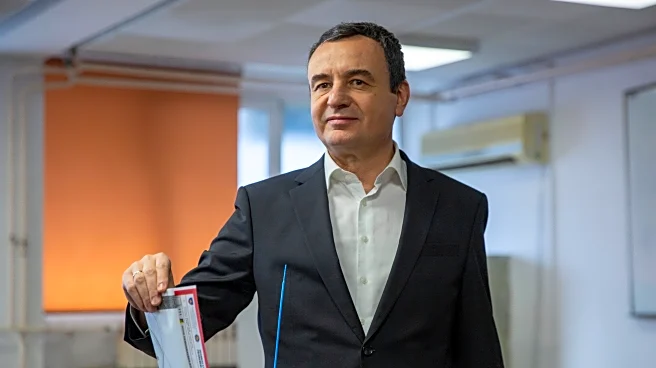Rapid Read • 8 min read
A United Nations-backed report has confirmed a famine in Gaza City, describing the situation as a 'failure of humanity.' The Integrated Food Security Phase Classification (IPC) has raised Gaza's food insecurity status to Phase 5, indicating 'catastrophic' conditions affecting over half a million people. The report attributes the famine to Israeli restrictions on aid entry, a claim Israel denies. Despite Israel's assertion of providing substantial aid, including 2 million tons since the conflict began, the UN and humanitarian groups argue that the aid is insufficient. The famine declaration has sparked international condemnation, with UN officials and other global leaders criticizing Israel's policies as contributing to the humanitarian crisis.
AD
The famine in Gaza represents a significant humanitarian crisis with potential geopolitical ramifications. The situation has drawn widespread international attention and criticism, highlighting the complex dynamics of the Israeli-Palestinian conflict. The humanitarian crisis could exacerbate tensions in the region, influencing international relations and potentially affecting U.S. foreign policy. The crisis underscores the challenges of delivering aid in conflict zones and raises questions about the responsibilities of occupying powers under international law. The situation also impacts the lives of hundreds of thousands of Gazans, with severe implications for public health and social stability in the region.
The international community is likely to increase pressure on Israel to allow more aid into Gaza. Humanitarian organizations may seek alternative routes or methods to deliver aid effectively. Diplomatic efforts could intensify to address the underlying causes of the conflict and improve the humanitarian situation. The UN and other international bodies may continue to monitor and report on the situation, potentially leading to further actions or resolutions. The ongoing crisis may also influence future peace negotiations and the broader geopolitical landscape in the Middle East.
The famine in Gaza raises ethical questions about the responsibilities of nations in conflict zones and the role of international law in protecting vulnerable populations. The crisis highlights the need for systemic changes in how humanitarian aid is delivered and the importance of ensuring access to basic necessities for all individuals, regardless of political circumstances. The situation may also prompt discussions on the effectiveness of current international aid mechanisms and the need for reform to prevent similar crises in the future.
AD
More Stories You Might Enjoy












